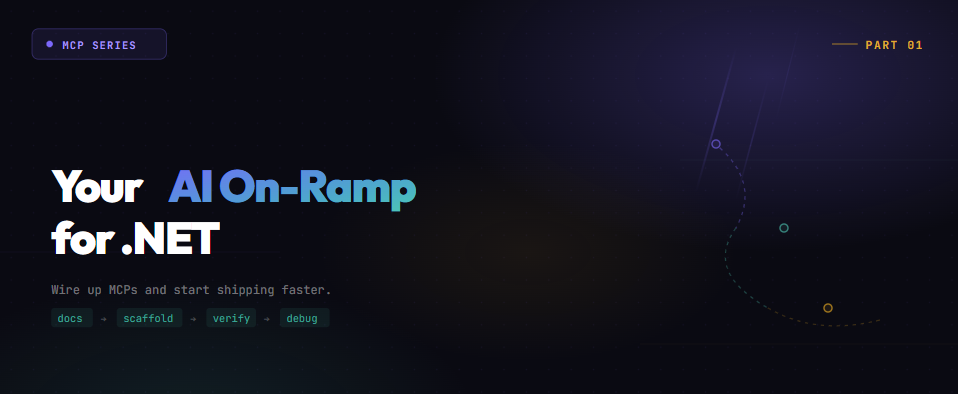🕓 5 MINThe On-Ramp to AI-Assisted Development with Uno Platform
Model Context Protocol Demystified
Artificial Intelligence (AI) is slowly changing the way we live and work, and AI’s popularity is driving adoption in enterprise/consumer apps – a techtonic shift in the tech industry. As AI gets to be more pervasive in the software development industry, there is a clear need to bring more contextual intelligence to Agentic workflows – Model Context Protocol can help.
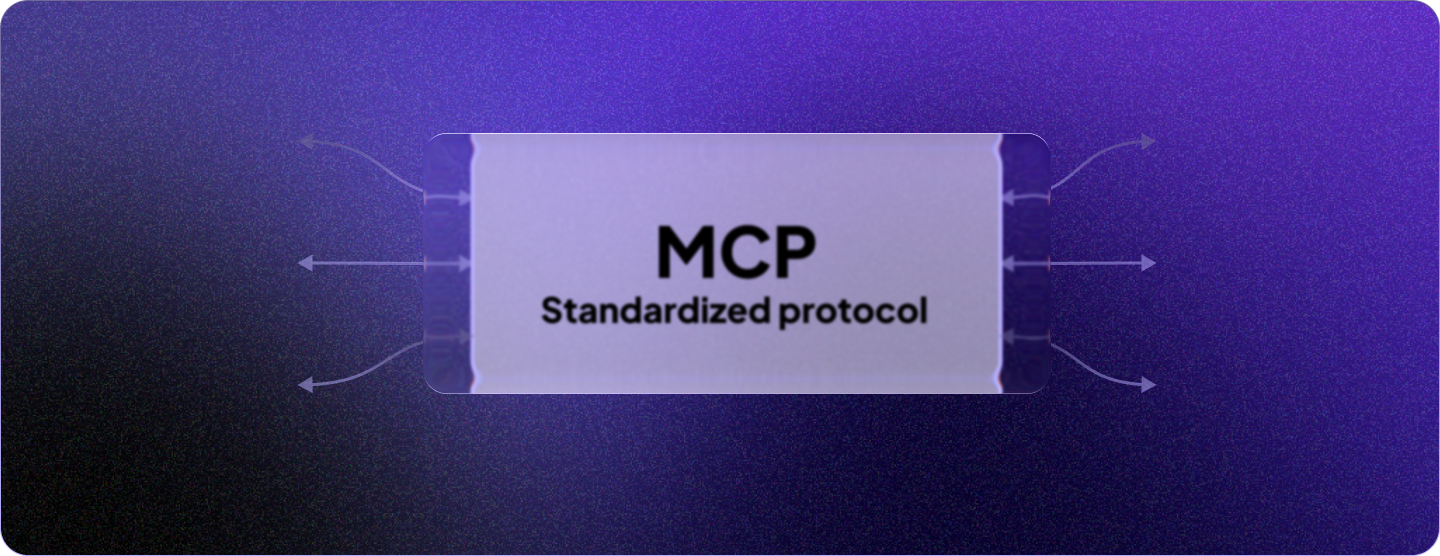
The Age of AI
It is the age of AI – while AI is evolving many aspects of human interactions, the impact on software is particularly interesting. There is a huge opportunity for developers to infuse apps with solutions powered by generative AI and large/small language models – the end result should be smarter apps and better user experiences. Modern AI is also an opportunity to streamline and automate developer workflows for better productivity – AI can do much of the mundane code writing, freeing up developers to review code and guide architectural decisions.
Today’s generative AI Models are powerful systems capable of understanding human natural language to hold conversations and respond to prompts with text, code, audio, video and other types of creative content. Powered by unsupervised learning and deep neural networks, today’s general purpose AI models sport support for huge amounts of parameters/tokens and have massive processing power supported by seemingly unlimited wealth of knowledge.
However, despite all the smartness, AI Models struggle with a few foundational problems that are baked in by design:
- Knowledge used to train the models is often time stamped
- Grounding techniques like Retrieval Augmented Generation (RAG) are hard to scale
- AI Models are good at generative content, but cannot pull off concrete actions
- Models are pattern-matching systems, not computational workhorses
- AI lacks specific context for personal/enterprise tasks
- Without specilized tools, AI responses are not predictable & repeatable
- With randomness built-in, AI Models cannot be included in automation of tasks
As we graduate to more Agentic workflows where AI Agents perform concrete actions on behalf of users, context would be key – specialized tools that can provide grounding and help AI perform repeatable tasks.
Why MCP
Model Context Protocol (MCP) is an industry protocol that standardizes how applications provide context to AI Models/Agents — developers can think of it as a common language for information exchange between AI Models/Agents and custom endpoints with specialized tooling. MCP aims to provide a standardized way to connect AI to different data sources, tools and non-public information. The point is to provide deep contextual information/APIs/data to AI Models/Agents. MCP services also support robust authentication/authorization toward executing specific tasks on behalf of users – security is well thought out. Originally developed by Anthropic, lots of of tech companies and AI stakeholders now participate in further developing the MCP specifications toward global standardization – this is good news for developers looking to extend AI capabilities with reliable and contextual tooling.
While early days, there is plenty of excitement around MCP. With a flexible stable specification, MCP can play a big role in standardizing information exchange between AI Models/Agents and various data sources for grounded AI responses/tooling usage.
MCP Architecture
Typically, three types of software/programs can leverage MCP:
- A Client is essentially the AI workhorse that communicates 1:1 with MCP Servers. Examples — GitHub Copilot, ChatGPT, Tabnine and more.
- A Host houses a client and leverages MCP for access to specialized data/tools. Examples — VS Code, Visual Studio, Claude Desktop, Cursor AI and other coding editors/IDEs.
- An MCP Server is a hosted program/endpoint that exposes specific capabilities through the standardized MCP communications.
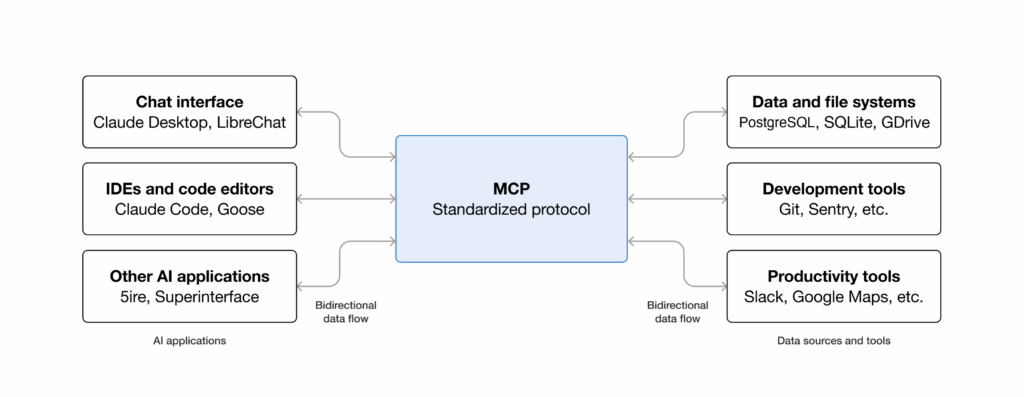
AI Agentic Power
While MCP clients/hosts will serve specific needs, the biggest benefit of MCP standardization is democratizing access to specialized tooling through MCP Servers to AI agents. Developers can easily build MCP Servers that bring in the context – custom APIs, enterprise data/services and capabilities for executing specific taks for authenticated/authorized users. It is easy to envision MCP Servers having multiple tools that are exposed to AI Models and Agents.
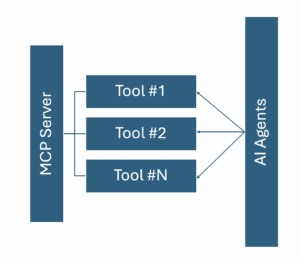
AI Agents can leverage AI Models for Natural Language Processing (NLP) and as Small/Large Language Models – this brings the general purpose or custom trained knowledge as vast resources for the AI Agents to carry out actions in response to human conversations. In addition, AI Models could have access to multiple MCP Servers, each bringing unique context and specialized tools that can accomplish tasks for the user. AI Agents are less likely to guess or hallucinate when they have a plethora of custom tools that can pull off the user tasks – it is a matter of matching up the tool’s expertise to the tasks at hand.
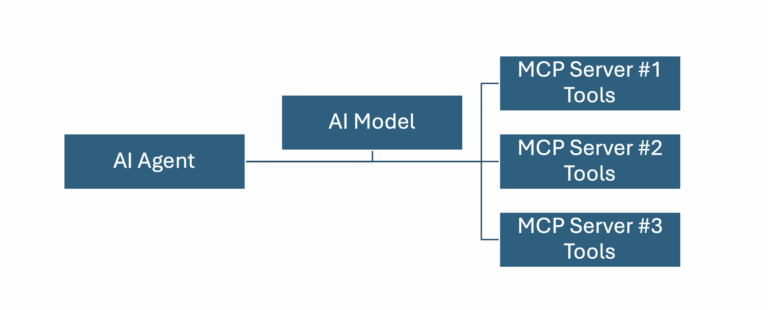
Building for MCP
Communications between AI Models/Agents leveraging MCP hosts/clients and MCP servers happens over well defined protocols:
- The Data layer defines the JSON-RPC based protocol for client-server communications
- The Transport layer defines the communication mechanisms/channels that enable data exchange over Stdio or Streamable HTTP with Server Sent Events (SSE)
For developers who see the promise of MCP and want to get started building MCP clients/servers to augment AI Agentic experiences, there is plenty of help. For starters, there are well-defined SDKs for building MCP servers/clients – developers can choose the programming language and technology stack that best suites them. Available MCP SDKs include:
- TypeScript
- Python
- Go
- Kotlin
- Swift
- Java
- Ruby
- Rust
- PHP
- And of course, C# MCP SDK
The SDKs are meant to provide abstractions so developers can get to the core of building innovative MCP servers/clients to bring contextual intelligence to AI. The MCP specs are well defined, with solid documentation and there are established developer experiences with testing, logging, debugging and security – MCP makes it easy to bring context to today’s AI.
MCP All The Things
MCP Servers are starting to make an impact – bringing custom data/services/APIs to AI Agents. Developers can start building with MCP and benefitting from available MCP servers right away – while things work about the same in every IDE, let’s explore the VS Code experience. When developers pull up the GitHub Copilot AI chat experience in VS Code, the default mode is with AI Agents – while Ask/Edit modes are there, Agents are clearly the way forward for automating developer tasks. Developers do have the option of choosing which AI Models the Agent should use, including latest GPT models from OpenAI or Sonnet models from Claude – if not, the AI Agent can pick the best AI model given the task at hand.

Developers can hit the little Settings/Gear icon within the GitHub Copilot AI chat window – and voila, you see all the default MCP Tools the Agent has access to.
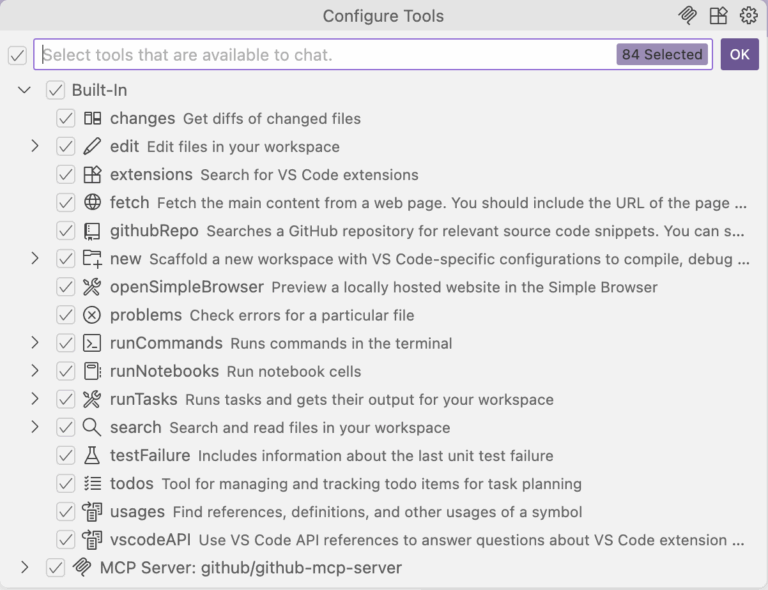
Developers can add new MCP Servers/Tools to their toolchain – published MCP tools can be added through Pip/UV/Docker/NPM.

With Visual Studio/VS Code, there is starting to be a Marketplace for MCP Servers/Tools – developers can simply browse and one-click install preferred MCP Tools for AI Agents to have more contextual muscle.
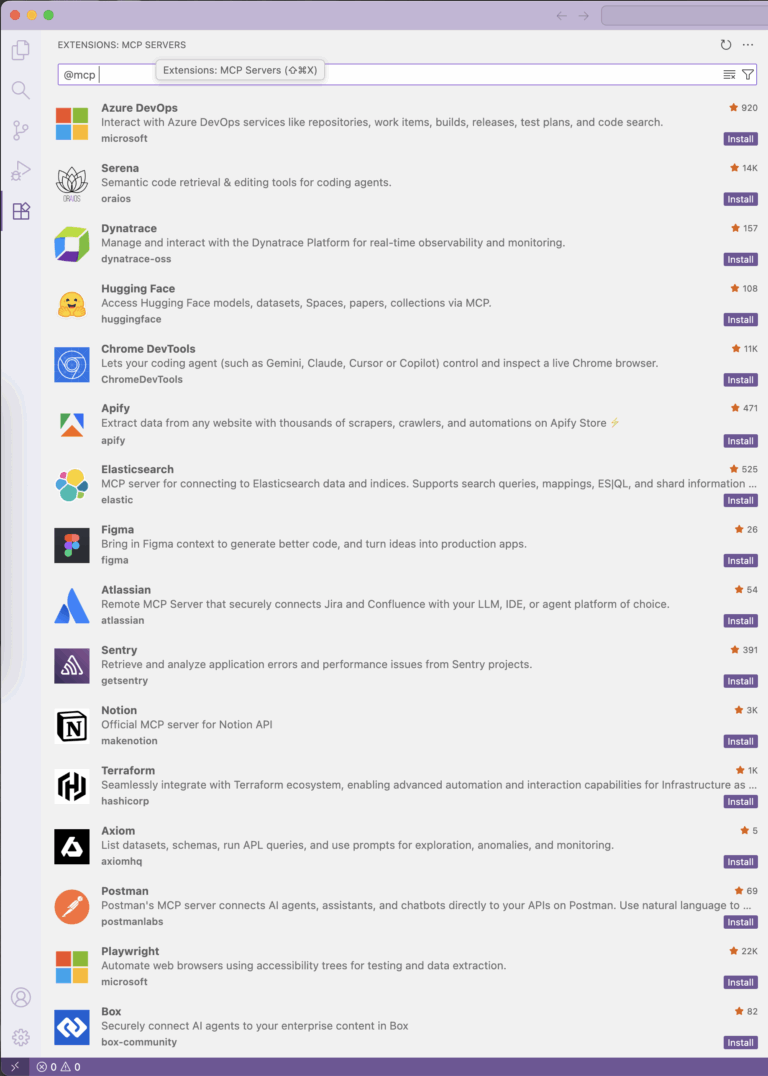
There is also plenty of inspiration for developers to build for MCP – there are reference MCP Servers & Clients, MCP Registry, curated collection of MCP Servers/Clients and lists of awesome servers.
Conclusion
Model Context Protocol (MCP) aims to standardize how applications provide context to AI Models and Tools to AI agents. The advent of MCP looks to empower agentic workflows to have secure access to deeply contextual tasks and, in turn, AI workflows that are more predictable and beneficial to everyone. There is plenty of help and inspiration for developers to buid amazing things with MCP – bringing custom data/services/APIs to make AI Agents more contextually intelligent.
PS: Want to build MCP Servers in C# & put your context in action with modern AI? Please stay tuned for the next article!
Cheers developers. Let’s go change the world of AI.
Related Posts
🕓 5 MINThe On-Ramp to AI-Assisted Development with Uno Platform

